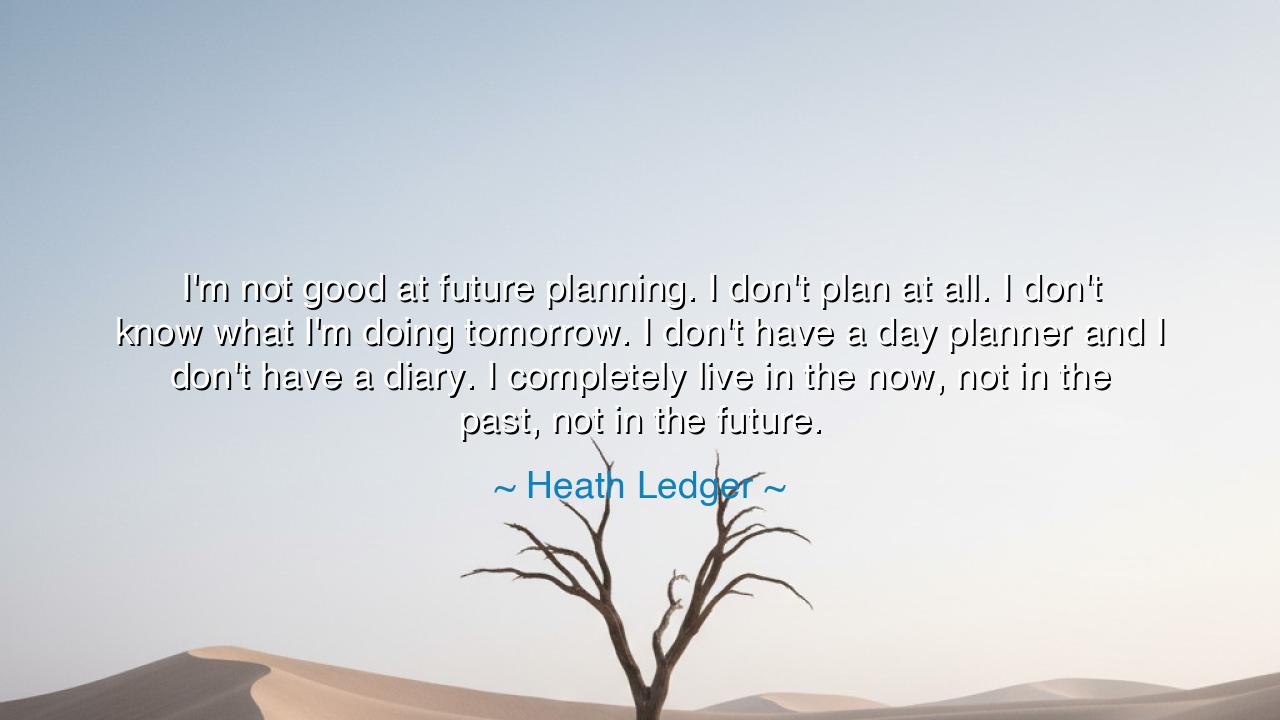
I'm not good at future planning. I don't plan at all. I don't
I'm not good at future planning. I don't plan at all. I don't know what I'm doing tomorrow. I don't have a day planner and I don't have a diary. I completely live in the now, not in the past, not in the future.






In the candid words of Heath Ledger, “I’m not good at future planning. I don’t plan at all. I don’t know what I’m doing tomorrow. I don’t have a day planner and I don’t have a diary. I completely live in the now, not in the past, not in the future,” we encounter a philosophy of living that is both radical and profound in its simplicity. Ledger speaks to the human tendency to plan and worry about the future, a practice that often detracts from our ability to experience life as it unfolds in the present moment. By rejecting conventional notions of future planning, he embraces the impermanence of time and encourages a way of living that is fully immersed in the now—free from the burdens of anticipation and regret.
This way of being echoes the teachings of the ancients, particularly those of the Stoics and Buddhist philosophies. Marcus Aurelius, the Stoic emperor, repeatedly emphasized the importance of living in the present and accepting the flow of life. In his Meditations, he advised that we should not waste time dwelling on things that are outside our control—whether that is the past or the future. His message was simple: we must focus on the present, where our actions are truly meaningful. In this, Ledger’s statement resonates with the ancient wisdom of Aurelius, who reminded us that it is in the now that we find the true measure of our lives.
In Buddhism, this concept is similarly central. Mindfulness, the practice of being fully present in the moment, is a cornerstone of Buddhist teachings. The Buddha spoke of the illusion of attachment to both past and future, encouraging his followers to release the need to control the unfolding of life. By letting go of attachments to both the future and the past, we can open ourselves to a deeper experience of life and the natural flow of events. Ledger’s rejection of the need to plan for tomorrow aligns with this Buddhist idea of embracing the present moment, where peace and clarity reside.
Consider the life of Socrates, who, though a man of deep philosophical thought, also valued living in the moment. While he encouraged others to reflect on their lives, Socrates also believed that true wisdom came from acknowledging that we cannot predict what will happen next. The only certainty, according to Socrates, was the present moment and our ability to live virtuously within it. He is remembered not for his future ambitions, but for how he lived fully in the now, questioning and examining the world around him without concern for the future or the outcome of his actions.
We also see a modern parallel in the life of Steve Jobs, whose vision for the future of technology was undeniably revolutionary, yet who emphasized the importance of focusing on the present as the means to achieve that future. Jobs famously said, “You can’t connect the dots looking forward; you can only connect them looking backward.” His life embodied a paradox: while he was undoubtedly future-focused in his innovation, he also embraced the present moment with intensity and passion. Like Ledger, Jobs understood that to achieve greatness, we must remain focused on the present, allowing it to shape our future in ways that are often unforeseeable.
The lesson embedded in Ledger’s words is clear: to live fully and meaningfully, we must give up the obsession with controlling or planning for the future. The present moment is all we truly have, and when we stop trying to plan and anticipate, we are able to engage with life in its full vibrancy and complexity. Just as the Stoics, Buddhists, and Socrates understood, it is in the present that true freedom and peace reside. Our futures will unfold as they will, but we are only capable of acting, thinking, and being in the now.
In practical terms, Ledger’s philosophy urges us to let go of the constant need to control or plan ahead. This does not mean abandoning responsibility, but it calls us to surrender to the flow of life and to trust that, by being present and true to our actions, the future will take care of itself. The key is to engage deeply in the moment, whether that is through mindful action in our work, relationships, or creativity. By focusing on the present, we open ourselves to the richness of life, finding purpose and fulfillment in what is immediate and real.
Finally, let us take Ledger’s wisdom as a reminder that life is not a linear path to a predetermined destination. We must be fully present in each step we take, without obsessing over what is ahead or what has passed. The ancients have taught us that the present moment is where we encounter life’s deepest truths. Let us live it with the full embrace of awareness, grace, and courage, as we trust that, through living fully in the now, we will find the future unfolding before us in ways we could never have planned or predicted.






AAdministratorAdministrator
Welcome, honored guests. Please leave a comment, we will respond soon